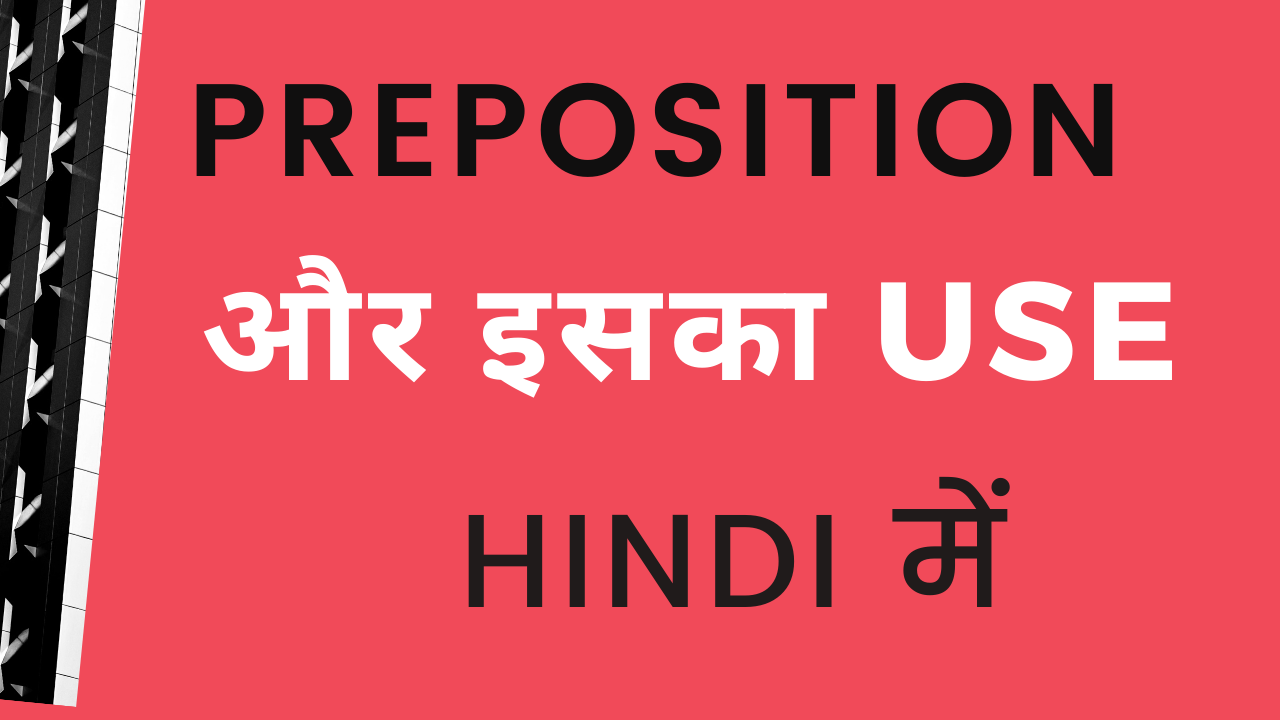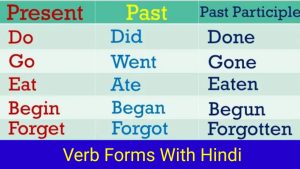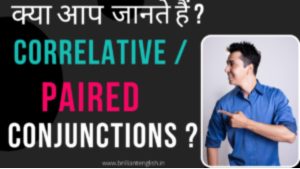- Prepositions are one the most important grammar elements which I can compare it that of as sand of building a house.
- You might be knowing that just as a house is constructed with the mixture of sand, chips and cement to solidify its base, in the same way prepositions are required to make English foundation strong.
- A person can’t speak better English without the good knowledge of how to use prepositions at the time of speaking English or writing it.
What are prepositions ?
Introduction :
जो शब्द किसी Noun या Pronoun के पहले प्रयोग होकर उस Noun या Pronoun का संबंध किसी दूसरे आदमी, चीज़ या शब्द के साथ स्थापित करे, तो उसे Preposition कहते हैं।
” A preposition is a word put before a noun or pronoun equivalent to show in what relation the person or thing de denoted by stands to something else.”
OR
” A preposition is a word kept before a noun or pronoun to point out its reference with another word.” As-
- There is a pen in my pocket.
- The magazine is on the desk.
- He is fond of coffee.
- They went with him.
उपर के वाक्यों में न० 1 में ‘in’ शब्द दो वस्तुओं या चीजों- pen and pocket (both nouns) में संबंध को दिखा रहा है।
वाक्य न० 2 में ‘on’ शब्द दो वस्तुओं या चीजों- magazine and desk (both nouns) में संबंध को बता रहा है।
वाक्य न० 3 में ‘of’ शब्द विशेषण (adjective) द्वारा व्यक्त गुण fond and coffee से (adjective and noun) में संबंध को प्रकट कर रहा है।
वाक्य न० 4 में ‘with’ शब्द क्रिया (verb) द्वारा व्यक्त काम went and him (verb and pronoun) में संबंध को ज़ाहिर कर रहा है।
इसलिए : in, on, of , with prepositions हैं। क्योंकि ये शब्द a. (Noun को noun से), b. Noun को noun से, Noun को adjective से, c. Noun या pronoun को verb से जोड़ता है।
Preposition का प्रयोग Noun या Pronoun के पहले होता है, फिर भी कभी कभी यह उस शब्द के बाद आता है जिसको यह शासित करता है।
1. Preposition को हमेशा वाक्य के अंत में रखा जाता है जब इसका object कर्म Relative Pronoun ‘that’ होता है। जैसे-
This is the pen I was searching for.
This is the kind of classical music that I like to listen to.
2. Preposition का प्रयोग वाक्य के अंत में होता है जब इसका object कर्म interrogative pronoun हो; जैसे-
What are you thinking of ?
Whom are you talking about ?
3. Preposition वाक्य के अंत में प्रयोग होता है जब इसका object कर्म relative pronoun छिपा रहता है; जैसे-
Here is the boy I was speaking of.
This is the bus I was waiting for.
2. Relations shown by preposition
वाक्य में prepositions का संबंध अलग अलग तरह के चीजों के साथ होता है जिनमें से ये सारे मुख्य हैं।
- Place
- Time
- Method and manner
- Reason and purpose
- Possession
- Direction and motion
- Measure and standard
- Rate value
(i) Place-
in Jamshedpur, in a room, in a box, in a garden, in a village, in a town, at the door, at the bus stop, at the Shop, at the railway station, at the airport, at Siwan, on the door, on the ground, on the chair, on the wall, on the beach, on a ceiling, on a page, across, among, behind etc.
As :-
She lives in Jamshedpur.
They are standing at the door.
There is a notice on the wall.
They fell among the thorns.
She ran across this road.
2. Time-
at five o’clock, at midnight, at sunset, on Tuesday, on 5 August 2019, on Diwali, in January, in 19th century, in 1995, before afternoon, after sunset, since morning, during the day, till tomorrow, for a week, in the week, in the middle ages, in the past, in Winter,
As:-
We arrived here at 6 o’clock.
He will come back in a week.
They came on Monday.
Wait till tomorrow.
3. Method and manner-
By, with, through
By hard labour he succeeded.
The letter came by post.
The news came through a friend.
Cut the apple with a knife.
4. Reason and purpose-
With, of, for
We work for the good of our country.
She died of fever.
He trembled with fear.
A Book is good for a student.
5. Possession-
Of, with, by
Ranchi is the capital of Jharkhand.
He is the man of principles.
I saw a boy with grey hair.
She came by a lot of money.
6. Measure, rate, standard, Value-
Cloth is sold by the yard.
Onions sell at sixty rupees per kilogram.
Kind of prepositions
Preposition के चार भेद होते हैं।
- Simple prepositions
- Compound prepositions
- Participle prepositions
- Phrase prepositions
1. Simple prepositions-
अंग्रेजी में single word, Preposition को simple Prepositions कहा जाता है। जैसे
at, in, on, for, to, by, up, off, from, through, till, after, never, under, down, upon, round, since
2. Compound Prepositions-
इस तरह के Prepositions prefixes लगाके बनाए जाते हैं।
Mainly compound Prepositions are : about, above, below, before, inside, outside, behind, within, among
(i) ABOUT ( on+ by+ out) :- nearness of some kind-
1. It’s about five o’clock: Nearness of time.
2. He is about to be married. Nearness of state.
3. I am fond of hearing about the battle. (Concerning)
(ii) ABOVE (on+ by+ up):- in a higher position.
1. A sword was hanging above his head. Over, higher than,
2. His expenses are above his means. More than
(iii) AMONG (on + gemang ; in a multitude):- Distribute the sweets among the boys.
I am fond of rambling among the flowers..
(iv) BEFORE (by + fore):- the contrary to “behind.”
1. She stands before the door. Infront of.
2. The train starts before six o’clock. Priority in time.
3. Death before dishonor. Priority of choice.
(v) BEHIND (by + hind) :- contrary to “before.”
1. The dog ran behind its master. At the back of.
2. The train is behind its time. Lateness in time.
3. I find a smile behind his frown. Concealment.
(vi) BELOW (by + low ) :- at a lower point of degree
1. He stood below me in the class. Lower than.
2. The number was below twenty. Less than.
3. Your achievements are below expectations. Interior to
(vii) BENEATH (by+ neath) :- in a lower position
1. Let them take rest beneath the shade of the tree. Under
2. Your conduct is beneath contempt. Inferiority
(viii) OUTSIDE ( something that happens outside: a particular period of time does not happen during the time.
1. You will have to do it outside office hours.
2. The bill was supported by a mass movement outside parliament.
(ix) INSIDE- Something or someone that is inside a place-
1. You left your lighter inside the taxi.
2. It’s a fruit with a seed inside.
(x) WITHIN – inside the limits of anything
1. I always sleep within door. Space.
2. She must be back within an hour. Time.
Positionof the Prepositions
1. Prepositions of place—At, In, On
(a) At – ‘at’ is used to talk about a place as a point; as: –
At home, at work, at the office, at school, at the University, at the bridge, at the cross-roads, at the bus-stop, at the door, at the gate
Some examples:
1. Who’s that girl standing at the gate ?
2. Write your name at the top of the page.
3. We wanted to read at home.
4. He landed at a small airport.
(b) In– ‘in’ is used to talk about a place as an area: as:-
in a room, in a garden, in a building, in a place, in a forest, in a desert, in a village, in a country, in a wood, or any place which has boundaries or is enclosed.
in or at the sea, in a river, in a lake, in a swimming pool- in here means actually in the water.
At the sea means near/beside the sea but at sea without an article means-on a ship.
Prepositions of travel and Movement
From, to, at, in, by, on, into, onto, off, out, out of
a) यात्रा के क्रम में from का प्रयोग starting place से और to का प्रयोग destination ( गंतव्य स्थान) के लिए किया जाता है; जैसे-
He drove from UP to Bihar.
I cycled from Jamshedpur to Chaibasa.
When is she coming back to Jharkhand ?
He sent a letter to the Prime minister.
b) arrive at/in, get to, reach ( without Preposition) = पहुंचना।
We arrive in a town or country.
We arrive at or in a village.
We arrive at any other destination.
As:-
We arrived in Chandni chowk in Delhi.
He arrived at the hotel/at bridge.
They arrived at the airport.




